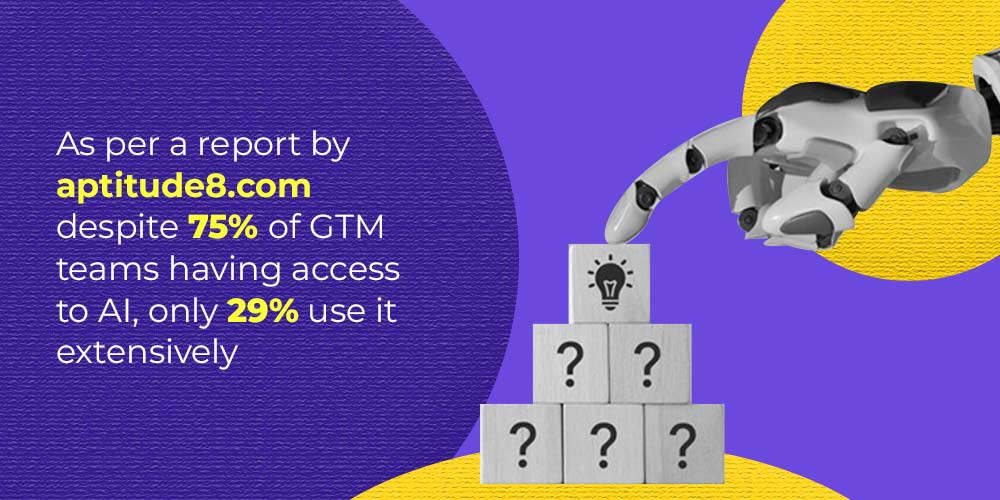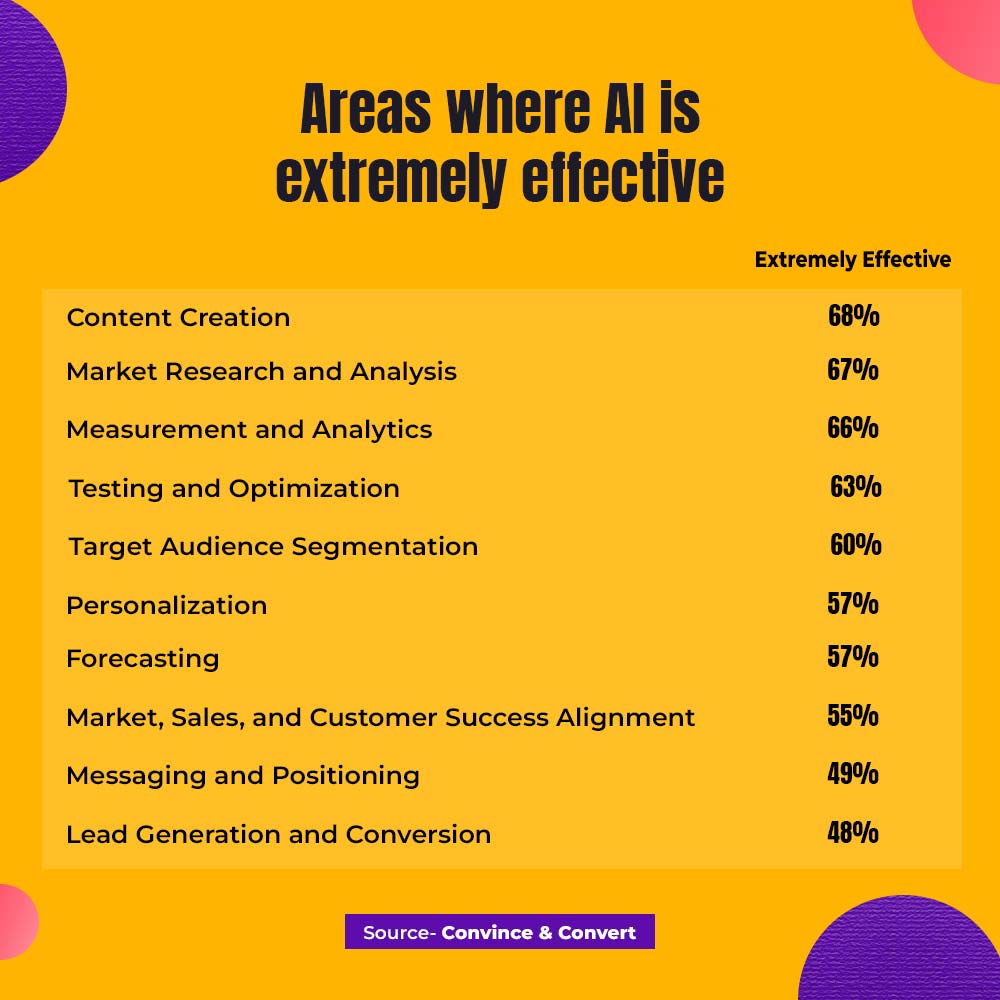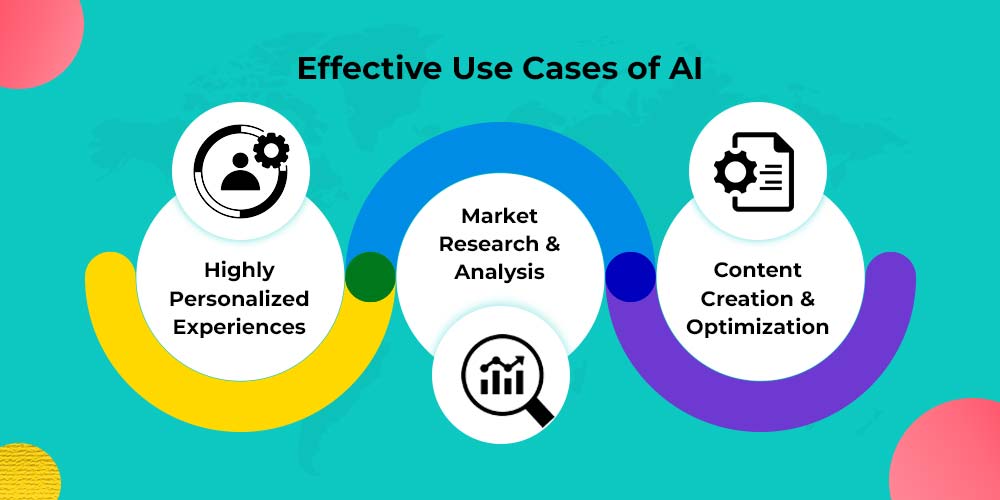AI-Powered GTM Strategies for Market Domination
In the dynamic realm of marketing, sales, and customer success, the buzz around Artificial Intelligence (AI) has reached a crescendo. Businesses are increasingly turning to AI-powered personalization as a game-changer for their Go-To-Market (GTM) strategies. Let’s delve into how AI is reshaping the future of GTM, its challenges, and effective use cases. Revolutionize your market approach with AI-powered insights in your GTM strategy


Embracing AI-Powered Personalization
Imagine a world where every interaction with your brand feels tailor-made for each customer. AI-powered personalization is not just a buzzword, it’s a strategy that leads to meaningful customer engagement and loyalty. Our document encourages exploring this as a starting point for using AI in GTM strategies. Unleash the power of AI in your GTM strategy, transforming data into decisive action.
Metrics and Measurement: The Pulse of AI Success
While the document highlights KPIs for team alignment, it’s crucial to understand how we measure the success of AI implementation. Metrics go beyond traditional ROI, they reflect customer satisfaction, retention rates, and revenue growth. For example, a company could track the percentage increase in repeat purchases or the reduction in customer churn after implementing AI-driven personalization. Unleash the power of AI for a smarter GTM strategy that sets you apart from the competition.
Challenges of AI Adoption: Navigating the Path Ahead
With innovation comes challenges. In the realm of AI adoption in GTM strategies, hurdles such as data quality concerns and integration difficulties may arise. For instance, ensuring that the data fed into AI algorithms is accurate and up-to-date can be a significant challenge. Additionally, integrating AI systems with existing GTM infrastructure requires careful planning and execution.


Future of AI in GTM: A Glimpse Ahead
Peering into the future, AI’s impact on GTM strategies is bound to intensify. Our document offers insights into how AI is expected to revolutionize customer interactions, market insights, and predictive analytics in the GTM sphere. For example, AI-powered chatbots are becoming increasingly sophisticated, providing personalized assistance to customers in real time.
Top GTM Priorities: Aligning for Success
In GTM strategies, alignment is key. Strong collaboration among Marketing, Sales, and Customer Success teams is a top priority. Tips for fostering this alignment include open communication, shared goals, and leveraging technology for seamless data sharing. For instance, implementing a Customer Relationship Management (CRM) system that integrates AI-driven insights can help align departments toward common objectives.
Department Needs: Bridging the Efficiency Gap
Efficiency matters across all departments, yet Marketing sometimes lags behind Sales and Customer Success. This gap could be attributed to the higher adoption of AI in Sales. By focusing on the customer journey and improved coordination, departments can boost satisfaction and success rates. For example, Marketing teams can leverage AI-powered analytics to better understand customer preferences and deliver targeted campaigns.
AI Under-Utilized: Unleashing the Potential
Surprisingly As per a report by aptitude8.com despite 75% of GTM teams having access to AI, only 29% use it extensively. Our document sheds light on this under-utilization and explores how AI can transform GTM strategies. To illustrate, a case study could be included highlighting a company that successfully implemented AI-driven personalization and saw a significant increase in customer engagement metrics.


Effective Use Cases of AI: Powering Personalization
- Highly Personalized Experiences: AI enables tailoring content, offers, and recommendations based on customer behavior and preferences. For instance, Netflix uses AI algorithms to suggest movies and shows based on a viewer’s watching history.
- Market Research & Analysis: Dive into vast datasets with AI to gain insights on consumer trends and competitor strategies. For example, e-commerce giant Amazon uses AI to analyze shopping patterns and optimize its product recommendations.
- Content Creation & Optimization: Streamline content creation and enhance performance with AI-driven optimization. Tools like Grammarly and Wordsmith utilize AI to generate and optimize written content.
Evolving Use of AI in GTM Strategy Making: Riding the Wave
Marketers are adapting to AI’s potential, with a shift towards social media listening and lead scoring. However, content creation and predictive analytics remain stalwarts in the AI toolkit. For instance, social media management platforms like Hootsuite now offer AI-powered sentiment analysis to understand audience reactions.
The Human Element in AI: Striking a Balance
While AI is a powerful tool, it’s essential to remember the human element. Successful GTM strategies blend AI capabilities with human creativity and insight. AI should augment human decision-making, not replace it entirely. By striking this balance, businesses can leverage AI to its fullest potential while retaining the unique touch that human expertise brings.
Ethical Considerations: Guiding AI Implementation
As AI becomes more integrated into GTM strategies, ethical considerations come to the forefront. Ensuring AI algorithms are fair, unbiased, and transparent is essential. Businesses must prioritize data privacy and security, especially when using customer data for AI-driven personalization. By setting ethical guidelines and regularly auditing AI systems, businesses can build trust with their customers and stakeholders. Transform your GTM game with AI’s strategic prowess, driving success at every turn.
Collaborative Learning: Upskilling Teams for AI
To fully harness the power of AI in GTM, businesses should invest in upskilling their teams. Training programs on AI tools and concepts can empower employees to leverage AI effectively in their roles. Additionally, fostering a culture of continuous learning and experimentation encourages innovation with AI in GTM strategies.
Conclusion: Embracing the AI in GTM Strategy
In conclusion, AI is not just a trend, it’s a transformative force in GTM strategies. By embracing AI-powered personalization, addressing challenges, and aligning departments, businesses can unlock unprecedented success. The future of GTM is AI-driven, and the time to harness its potential is now. With the right approach, businesses can create highly personalized experiences, gain valuable insights, and streamline operations with AI in their GTM strategies.







